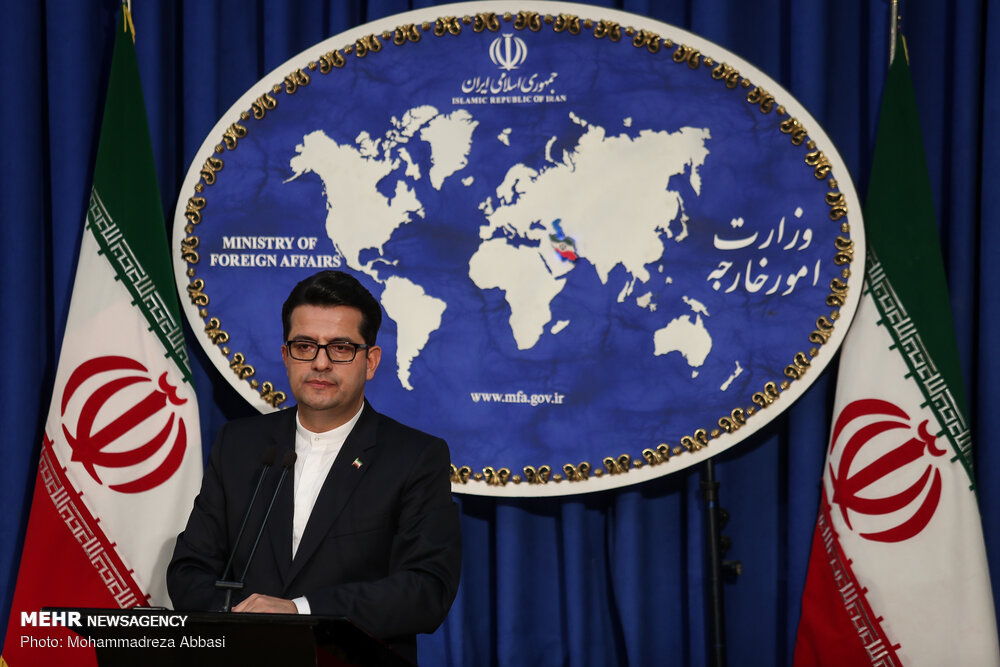Tehran says sanctions on petrochemical company proves Trump’s talks offer is hollow

TEHRAN – The Iranian Foreign Ministry on Saturday strongly denounced the U.S. Treasury’s latest move to impose new sanctions against an Iranian petrochemical company.
The United States has hit Iran’s Persian Gulf Petrochemical Industries Company (PGPIC) with economic sanctions due to its ties with the country’s Revolutionary Guards (IRGC), the Treasury Department said on Friday.
The move aims to choke off financing to the country’s largest and most profitable petrochemical group and extends to its 39 subsidiaries and “foreign-based sales agents,” Treasury said in a statement.
Those include UK-based NPC International and Philippines-based and NPC Alliance Corporation that are controlled by PGPIC.
Iran’s Foreign Ministry spokesman Seyyed Abbas Mousavi described the sanctions as an instance of “economic terrorism” and part of the White House’s “constant hostilities” towards the Iranian nation.
“Only one week was enough to prove American president’s claim that he seeks negotiation with Iran was a hollow one,” Mousavi said, according to the statement published on the ministry’s official website.
“The U.S. policy of maximum pressure is a failed policy that had already been tested by the country’s previous presidents for several times,” he added.
“Only one week was enough to prove American president’s claim that he seeks negotiation with Iran was a hollow one.”
Mousavi said this is a wrong path and the U.S. administration can rest assured it will not achieve any of the goals it had it mind when implementing the policy.
He also referred to certain American officials’ calls for negotiation with Iran describing them as deceitful and false claims aimed at attracting the attention of public opinion.
“America’s move [to impose sanctions on Iran’s petrochemicals] is against the basic principles and rules of international law and relations as well as the U.S. international commitments, and will lead to international liabilities for them [the US],” Mousavi added.
“All countries have a duty to show reaction to the blatant violation of the fundamental principles of the international law, and prevent the international community’s achievements in multilateralism from being further destroyed by the U.S. ruling system’s bullying and unilateral measures,” he noted.
In his Friday statement, U.S. Treasury Secretary Steven Mnuchin said, “This action is a warning that we will continue to target holding groups and companies in the petrochemical sector and elsewhere that provide financial lifelines to the IRGC.”
The PGPIC group holds 40% of Iran’s total petrochemical production capacity and is responsible for 50% of the country’s petrochemical exports, Treasury said.
Treasury warned that international companies continuing to partner with PGPIC or subsidiaries and sales agents “will themselves be exposed to U.S. sanctions.”
Following Trump’s decision to abandon the 2015 nuclear deal negotiated by his predecessor, U.S. efforts over the past year to choke off Iran’s economy have angered allies as foreign companies get caught up in the dispute.
Several countries have halted oil imports from Iran, while Europe has tried to design a mechanism to continue trading with the country without violating U.S. sanctions.
Treasury claimed it is penalizing PGPIC due to its links to the economic arm of the IRGC, known as Khatam al-Anbiya. It said the holding company has awarded contracts to Khatam al-Anbiya “generating hundreds of millions of dollars for an IRGC economic conglomerate that stretches across Iran’s major industries.”
Washington in April branded the IRGC a terrorist organization, the first time it has taken the step against part of a foreign government. The move meant anyone who dealt with the Revolutionary Guards could face prison in the United States.
The new sanctions prohibit the firm and its subsidiaries from accessing the U.S. market or financial system, including through other foreign companies, and blocks all funds or property that is in the United States or held by a U.S. firm.
The penalties could extend to “any foreign financial institution that knowingly facilitates a significant financial transaction or provides significant financial services for entities designated,” the statement said.
“By targeting this network we intend to deny funding to key elements of Iran’s petrochemical sector that provide support to the IRGC,” Mnuchin said.
Tensions between Washington and Tehran have escalated in recent weeks after Trump last month deployed additional troops to the region and resumed arm sales to Saudi Arabia to protect against what the United States claimed was the threat of an imminent attack.
Trump on Thursday said he would be willing to reopen talks.
Three analysts and a former Treasury official told the Guardian the latest sanctions will likely have only a modest effect because non-U.S. companies already shy away from doing business with Iran’s petrochemicals sector because of existing sanctions.
Suzanne Maloney of the Brookings Institution think tank described the latest U.S. sanctions as “a natural next step in what I think is a deliberately redundant array of restrictions.”
“The administration is banking on the overlapping authorities and obstacles to compound the pressure on the Iranians and create a sense that the entire economy is off limits,” she said.
SP/PA
